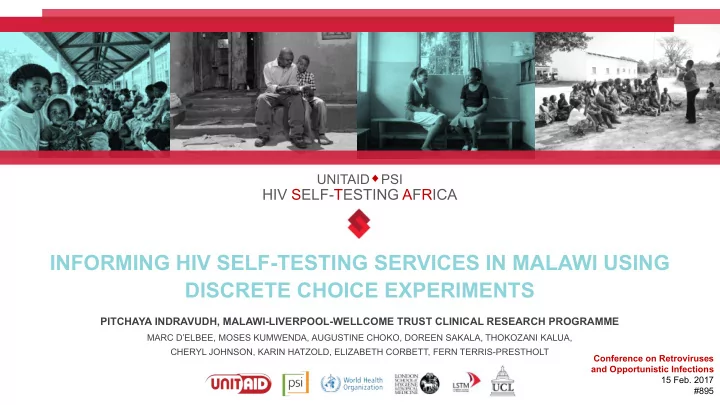

UNITAID PSI HIV SELF-TESTING AFRICA INFORMING HIV SELF-TESTING SERVICES IN MALAWI USING DISCRETE CHOICE EXPERIMENTS PITCHAYA INDRAVUDH, MALAWI-LIVERPOOL-WELLCOME TRUST CLINICAL RESEARCH PROGRAMME MARC D’ELBEE, MOSES KUMWENDA, AUGUSTINE CHOKO, DOREEN SAKALA, THOKOZANI KALUA, CHERYL JOHNSON, KARIN HATZOLD, ELIZABETH CORBETT, FERN TERRIS-PRESTHOLT Conference on Retroviruses and Opportunistic Infections 15 Feb. 2017 #895
BACKGROUND § Limited studies on variability in user preferences for HIVST § Discrete choice experiments (DCE): measure strength of user preferences § Few DCEs on HIV testing (Tanzania) and self-testing (Zambia) § This study adds to evidence on user preferences for HIVST models Ostermann PloS One 2014; Zanolini IAS 2016
METHODS Choice: A, B or opt-out § Objective: To determine relative preferences for delivery of HIVST kits and linkage to further testing and ART initiation and variation by sub-group § Formative phase: Literature review, individual interviews, pilot § Data collection: DCE with adults from randomly selected households in rural districts; delivery (n=707) and linkage to care (n=551) § Data analysis: multinomial logistic model; sex, age and prior HIV testing or HIV status interactions
RESULTS – DELIVERY • Price: Negative preference for price • Lesser degree among men and never- tested • Location: Home delivery preferred to health facilities and mobile clinics. • Greater degree among never-tested • Provider: Preference for lay distributors over HCWs and partners • Assistance: Indifference to pre-test assistance, but aversion to instruction leaflets for post-test assistance • Never-tested preferred more extensive support
RESULTS – LINKAGE • Assistance: Indifference to post-test support following positive self-test • User fees: Relatively unimportant • Location : Preference to link at home or home of HCWs compared to health facilities or mobile clinics • Services: Positive preference for short waiting time and HIV service- specific waiting rooms • Greater degree if HIV positive
CONCLUSION § General population: § Delivery: preference for home access and low-cost distribution by lay providers with some level of post-test support beyond the instruction leaflet § Linkage to care: preference for services at home or home of HCW with a short waiting time and separate waiting rooms at health facilities § Men: less averse to price and instruction leaflet as post-test support § Never-tested: stronger preference for home access and comprehensive pre- and post-test support, less averse to price
Recommend
More recommend